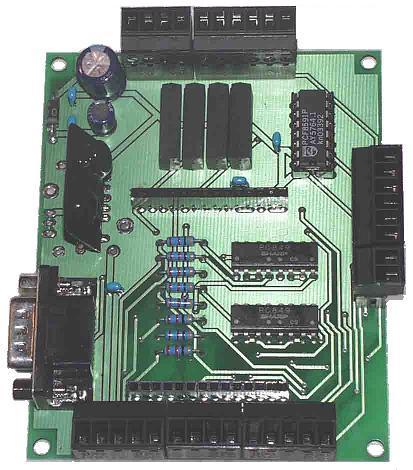 RS-232
/ I²C &
Parallel I/O Adapter Module
RS-232
/ I²C &
Parallel I/O Adapter Module
RpSi2o3i2c |
Note: This version has been replaced with the newer version 3.2.
 RS-232
/ I²C &
Parallel I/O Adapter Module
RS-232
/ I²C &
Parallel I/O Adapter Module
RS-232: This module is used to control external components via the I²C bus using simple command sequences sent and received via an RS-232 port from an application running on a PC (sample Visual Basic application with source code is included), PDA, or other platform. The on-board MAX-232 level shifter insures there will be no signal level problems and allows for maximum cable length.
I²C Bus Master: The RS-232 / I²C-Adapter acts as an I²C master, and can perform the most frequently used read/write operations via the bus without the need for the application software to handle the I²C protocol. When the application sends one of the "macro command sequences", the adapter takes care of generating the start condition, transmitting the address plus the R/W bit, transmitting/receiving data bytes plus setting/reading the acknowledge bit, and finally generating the stop condition. All of this is transparent to the application software.
I²C low-level: To ensure compatibility, the adapter also allows the application software to directly "talk" to the I²C bus in order to allow communications with I²C devices that require non-standard sequences, using "low-level commands".
I²C Monitor: In its Monitor mode, the module acts as an I²C "spy", i.e. it passively monitors an I²C bus, and sends the byte data transferred via the bus together with the information, if there was an acknowledge, or not via RS-232. An internal 32-byte FIFO buffer, together with an 115.2 kBaud RS-232 rate allows for I²C bus rates of up to 100 kBit/s to be monitored.
Relay Output: In addition, the RS-232 / I²C-Adapter comes with a reed relay which can be controlled by dedicated commands. This allows the application software to initialize various devices via the I²C bus before finally turning on the power supply for other components, for example. Besides this, the relay may also be used as a general-purpose isolated output.
General Purpose I/O: There are also four non-isolated outputs, and eight non-isolated inputs that can be set/read by specific adapter commands. The inputs also clock eight individual 16-bit counters that may be read/reset by designated adapter commands.
Reliable WDT: As an additional option, a timer may be activated that resets the I²C-Adapter when new commands are not received within the specified time-out period.
Status Indicators: Thee LEDs are used to indicate the status of the RS-232/I²C-Adapter, the activities on the I²C bus, and the RS-232 lines.
The RS-232/I²C-Adapter is based upon a Ubicom/Parallax SX-28 microcontroller, clocked at 50 MHz. Single, pre-programmed chips are available for customers who want to integrate the RS-232/I²C-Adapter's functionality into their own hardware design (see below).
All modules are shipped with a CD-ROM containing the documentation, schematics, assembly instructions, and the sample VB application project.
 Relay/Iso/Analog I/O Module w/
Power Conversion
Relay/Iso/Analog I/O Module w/
Power Conversion
This is a companion board for the RS-232/I²C-Adapter which can piggy-back via two 14-pin header sockets.
DB-9 Connector: An on-board standard SUB-D 9 connector is provided to directly connect the RS-232/I²C-Adapter's serial port to a COM port.
Isolated Inputs: It also contains eight PC849 opto-isolators to convert the RS-232/I²C-Adapter's input lines into isolated inputs.
Relay Outputs: Four reed relays are included to isolated the 4 TTL outputs from the RS-232/I²C-Adapter. The RS-232/I²C-Adapter relay output is fed-through to two separate connectors.
Analog I/O: In addition, the board comes with a Philips PCF8591 chip which extends the I/O capabilities of the RS-232/I²C-Adapter to four 8-bit analog inputs, and one 8-bit analog output.
Power : An on-board DC/DC converter enables this module to accept any DC supply voltage from 8V to 38 V, un-regulated. The DC/DC converter output is available to supply other components that are connected to the Parallel/Analog I/O Board.
All modules are shipped with a CD-ROM containing the documentation, schematics, and assembly instructions.
Comments:
| file: /Techref/scenix/rsi2o3i2c/index.htm, 9KB, , updated: 2013/7/22 17:43, local time: 2025/10/31 23:50,
216.73.216.123,10-1-33-36:LOG IN
|
| ©2025 These pages are served without commercial sponsorship. (No popup ads, etc...).Bandwidth abuse increases hosting cost forcing sponsorship or shutdown. This server aggressively defends against automated copying for any reason including offline viewing, duplication, etc... Please respect this requirement and DO NOT RIP THIS SITE. Questions? <A HREF="http://techref.massmind.org/Techref/scenix/rsi2o3i2c/index.htm"> RS-232 / I²C-Adapter & Parallel I/O Module</A> |
| Did you find what you needed? |
Welcome to massmind.org! |
|
Ashley Roll has put together a really nice little unit here. Leave off the MAX232 and keep these handy for the few times you need true RS232! |
.